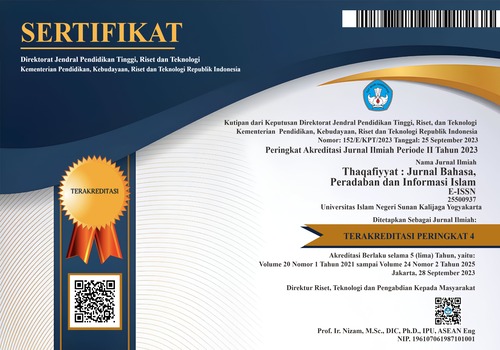FATWA DALAM SEJARAH POLITIK IRAN
DOI:
https://doi.org/10.14421/thaq.2015.%25xAbstract
Recently, the study of political Islam are generally still deals with the debate about the most ideal political system which should apply. Some choose to discuss on how the implementation of the Islamic system in modern society is relatively more pluralist and secular. Therefore, not to get hung up on a similar discussion, the author is interested in reviewing one of the state which experience has managed to implement a system of political Islam in this modern era, namely Iran. With the political system of velayat al-faqih who interpreted from the perspective of Shia
ideology as the country’s main imamiyah, Iran deserves further examined particularly associated several implementations of Islamic concepts that have been instituted in such a way in the political system. The author sees a one political concept that has the highest authority in Iran’s political system is at once part of the concept of religion is
interesting when and discussed. The concept is a fatwa which previously only was one topic of discussion in the study of jurisprudence, not affecting politics at all. Then, at this time, the treatise the author wanted to expose in a dialectical-historical account of how the emergence of the fatwa as an important part of the political system in Iran.
Keywords: Iran, the shi’i al-Imamiyah, velayat faqih, fatwa, rahbar
Downloads
References
Downloads
Published
Issue
Section
License
Authors who will publish with this journal agree to the following terms:
- Thaqafiyyat: Jurnal Bahasa, Peradaban dan Informasi Islam publishes all articles entirely in full text.
- It is permissible for readers to download and to use it for scientific purposes and scientific dissemination.
- Authors retain copyright and grant the journal right of first publication with the work simultaneously licensed under a Creative Commons Attribution License that allows others to share the work with an acknowledgement of the work's authorship and initial publication in this journal.
- Authors are able to enter into separate, additional contractual arrangements for the non-exclusive distribution of the journal's published version of the work (e.g., post it to an institutional repository or publish it in a book), with an acknowledgement of its initial publication in this journal.
- Authors are permitted and encouraged to post their work online (e.g., in institutional repositories or on their website) prior to and during the submission process, as it can lead to productive exchanges, as well as earlier and greater citation of published work.










